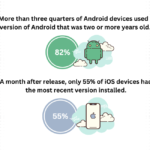The Future of Mobile Apps: Trends to Watch in 2025 – The Future of Mobile Apps Trends to Watch in 2025 sets the stage for an exciting exploration into the evolving landscape of mobile technology. As we step into a new era, mobile apps are no longer just tools for communication; they are pivotal components of our daily lives, influencing everything from how we work to how we interact with the world around us.
This discussion will delve into the key trends shaping the development of mobile applications, highlighting the innovative features and technologies that promise to redefine user experiences in the coming years.
From the rise of artificial intelligence to the integration of augmented reality, the future of mobile apps is bright and full of potential. With the increasing demand for seamless user experiences and the ongoing advancements in technology, developers are faced with both opportunities and challenges. This article will provide insights into what to expect in the mobile app industry as we approach 2025, ensuring you’re well-equipped to navigate this dynamic environment.
In today’s fast-paced world, technology continues to evolve rapidly, impacting nearly every aspect of our lives. From communication to business, and even leisure, the permeation of technology into our daily routines has sparked a significant transformation in how we interact with one another and the environment around us. This article delves into some of the most notable ways technology has shaped our world, particularly focusing on communication, education, healthcare, and entertainment.
Communication: Bridging DistancesGone are the days when written letters took weeks to reach their recipients, or when a long-distance call was a luxury few could afford. Technology has redefined communication, allowing us to connect instantly with others around the globe. The advent of smartphones and social media platforms has made it easier than ever to stay in touch with friends and family, regardless of geographical barriers.
Applications like WhatsApp, Facebook, and Instagram have transformed not only personal communication but also the way businesses engage with their customers.Moreover, the rise of video conferencing tools such as Zoom and Microsoft Teams has revolutionized professional communication. Remote work has become the norm for many, breaking the traditional office setting and providing flexibility. This shift has not only changed how teams collaborate but also brought about discussions on work-life balance and productivity in a digital workspace.
Education: Learning Without BordersThe impact of technology on education has been profound, ushering in an era of online learning and resources that were previously unimaginable. Students now have access to a wealth of information at their fingertips, enabling them to learn at their own pace and according to their own interests. Platforms like Khan Academy, Coursera, and edX offer a variety of courses, catering to diverse learning preferences and schedules.Furthermore, technology has facilitated inclusive education.
It allows students with disabilities to access materials and learning environments that accommodate their needs. Tools such as speech-to-text software, audiobooks, and interactive apps have made learning more accessible for everyone.However, the shift towards digital learning has also presented challenges. The digital divide remains a significant issue, as not all students have equal access to technology and reliable internet. This disparity can hinder educational progress and exacerbate existing inequalities.
Therefore, as we embrace technology in education, we must also strive to ensure that it is equitable for all students. Healthcare: A New Era of MedicineTechnology has also made remarkable strides in the field of healthcare. Telemedicine has become increasingly popular, allowing patients to consult with healthcare providers from the comfort of their homes. This is particularly beneficial for those living in remote areas or for individuals with mobility challenges.
Moreover, wearable technology, such as fitness trackers and smartwatches, enables individuals to monitor their health continuously, fostering a culture of preventive care.Artificial intelligence (AI) is revolutionizing diagnostics and treatment plans. Machine learning algorithms can analyze vast amounts of data to identify patterns and predict outcomes, leading to more accurate diagnoses and personalized treatment strategies. This innovation not only improves patient care but also optimizes the use of medical resources, ultimately enhancing the efficiency of healthcare systems.However, the integration of technology in healthcare raises ethical concerns, particularly regarding data privacy and security.
Ensuring that patient information remains confidential while leveraging technology for better care is a challenge that healthcare providers must navigate carefully. Entertainment: A Digital PlaygroundThe entertainment industry has undoubtedly been transformed by technological advancements. Streaming services like Netflix, Hulu, and Disney+ have changed the way we consume media, allowing us to watch our favorite shows and movies on-demand. This shift from traditional cable television to streaming has given rise to binge-watching culture and has fundamentally altered our viewing habits.Additionally, the gaming industry has witnessed unprecedented growth, with online gaming communities and eSports gaining popularity.

Virtual reality (VR) and augmented reality (AR) technologies have taken gaming to new heights, providing immersive experiences that blur the lines between reality and the digital world. Moreover, social media platforms have become influential in shaping popular culture, allowing content creators to reach audiences directly and build their brands without relying on traditional media channels. This democratization of content creation has led to a diverse range of voices and perspectives being represented in the entertainment landscape.In conclusion, technology has undeniably reshaped our world in profound ways.
From enhancing communication and education to revolutionizing healthcare and entertainment, its impact is felt in every corner of our lives. While the benefits are numerous, it is vital to address the challenges and ethical considerations that come with this rapid evolution. As we continue to navigate the ever-changing technological landscape, fostering a balance between innovation and responsibility will be crucial for ensuring that technology serves as a force for good in society.



